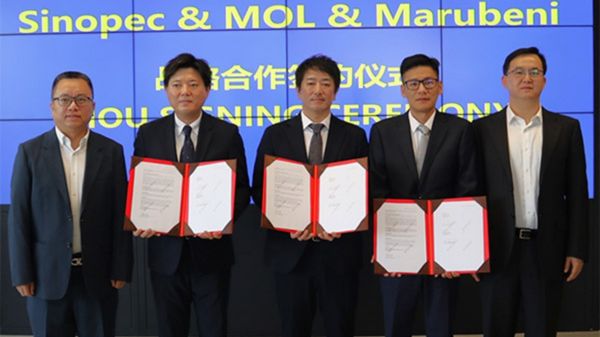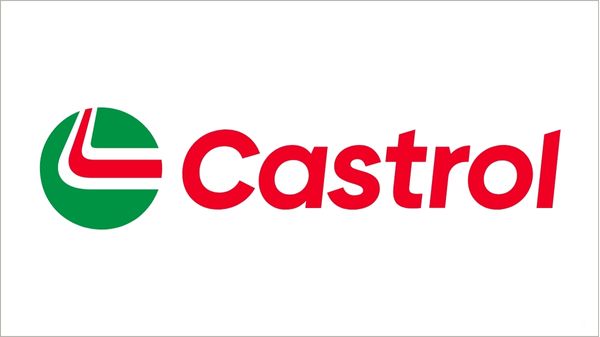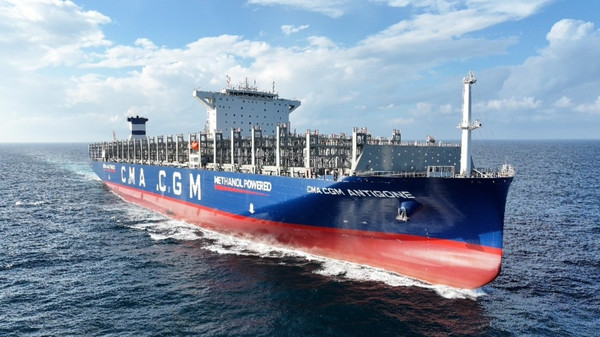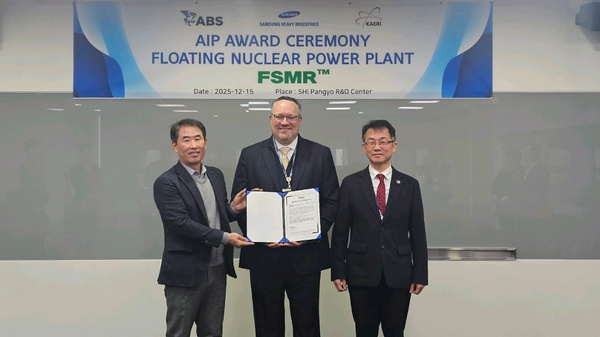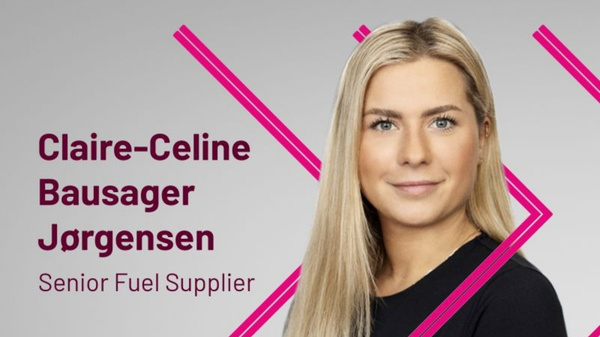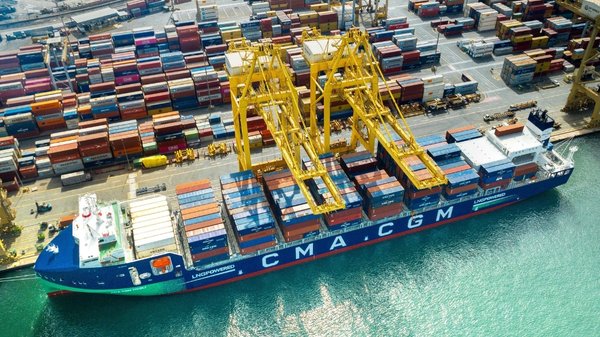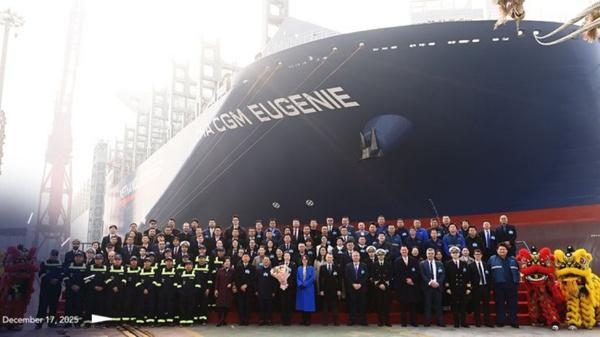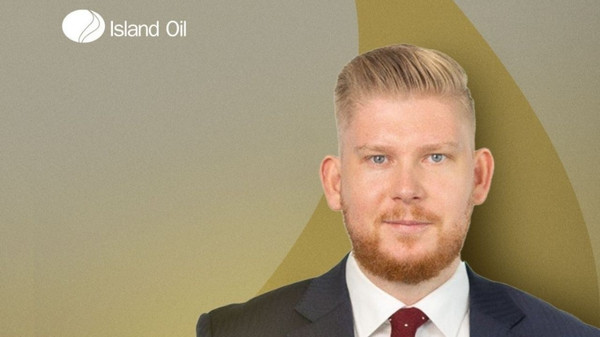Balancing environmental aspirations with economic realities, but also with political realities is not easy, International Chamber of Shipping (ICS) chairman
Spyros M Polemis is set to tell delegates at the influential CMA Conference in Connecticut this week.
In a speech entitled "Balancing Environmental Aspirations With Economic Realities," Mr Polemis is set to:
* highlight the danger of aspirational legislation;
* stress that shipping is a global industry requiring global rules;
* urge legislators to ensure their proposed environmental legislation is compatible with technical and economic realities.
Urging US states not to implement their own rules, Mr Polemis is set to point out: "If major trading nations such as the US adopt rules that are at variance to those agreed by governments at IMO, we have chaos, and if individual US states decide to implement their own rules in conflict with Federal requirements, it is even worse - we actually run the risk of double chaos."
In particular, Mr Polemis will highlight the issues of ballast water management and sulphur emissions – pointing out the need to ensure enough low sulphur fuel is available to enable the international shipping community to meet low emissions requirements and the need to establish that equipment actually exists to meet ballast water treatment standards.
He will also discuss industry concerns that Market Based Measures may be seen by some governments as fund-raising opportunities with the shipping industry viewed as a “cash cow” by some.
He will conclude that shipping should be treated like a sovereign state in its own right: “A ship may be flagged in one country, and owned in another, while the cargo carried will be of economic benefit to a variety of different importing and exporting nations. This is why we need to maintain a special global regime for shipping,” he is set to say.
Speech - CMA Conference, Connecticut
A copy of the speech Polemis is expected to give has been included below.
Balancing environmental aspirations with economic realities, but also with political realities is not easy. The reduction of CO2 emissions is certainly one of the most politically and economically complex subjects, but I will return to this in more detail in a moment. The need to protect the environment however goes far beyond global warming, and I will first make some general remarks about some of the other difficulties that we face, and as an example, we will focus on the difficulties we face in the United States.
The ultimate goal of the shipping industry is simple: zero accidents, zero loss of life and zero pollution. In view of the huge liabilities involved for non-compliance this is a matter of enlightened self-interest. Particularly when speaking in the United States, it is always important to stress that we are a global industry requiring global rules. If major trading nations such as the US adopt rules that are at variance to those agreed by governments at IMO we have chaos; and if individual US States decide to implement their own rules in conflict with Federal requirements, it is even worse, we actually run the risk of double chaos.
Right now we face a particular challenge with ballast water, with some individual States talking about treatment standards 100 times more stringent than what has been agreed at IMO and for which the equipment required simply does not exist.
Then it is California, and their unilateral air pollution rules, which are still subject to legal challenge by the industry, although following the entry into force of the IMO MARPOL requirements on sulphur emissions from ships, the temptation for individual States to develop their own environmental rules will hopefully diminish. As a general remark, however, I have to say that we have been disappointed by the apparent reluctance of the current US Administration to defend Federal regulations from infractions by US States.
Unfortunately, with ballast water, the problem we have with some US States choosing to go their own way, has been compounded by the failure of the IMO Ballast Water Management Convention to enter into force, although this should now be expected to happen within the next year or so.
Also, regrettably, at a recent IMO meeting – under pressure from the United States, or more particularly the EPA – some major changes were proposed to some important draft guidelines on ballast water sampling that will be used by port state control inspectors and which could potentially be very damaging to shipowners if adopted by IMO. ICS made a strong statement at the end of the IMO meeting about the direction that had been taken and thus the draft guidelines will now be reconsidered. However, this now means that these sampling guidelines will not be approved until at least 2013, which in turn is expected to further delay the additional ratifications needed to bring the IMO Ballast Water Management Convention into force. This creates other problems for shipowners due to the fixed dates by which existing ships have to install the very expensive new treatment equipment required by the Convention.
I mention this particular issue in order to highlight the danger of aspirational legislation. For reasons that are well understood, including the economic damage to the US economy from the unwanted influx of zebra mussels, there was huge political pressure for IMO to adopt the Convention back in 2004. But the equipment needed to comply with the new requirements, and the complex technical guidelines needed to ensure proper implementation, had not then been developed – which is why it is only now that governments are almost in a position to ratify. This is really a case of environmental aspirations being incompatible with some of the technical realities not to speak of economic ones.
I mentioned previously the implementation by the United States of the new IMO low sulphur fuel requirements in the MARPOL Convention. This includes the establishment of an Emission Control Area , along the west and east coasts, in which ships will be required to burn fuel with a sulphur content of 1% this year, and just 0.1% in 2015.
ICS has no objection in principle to this dramatic regulatory change which is consistent with the agreement reached at IMO three years ago, and which is being similarly implemented in Europe, in the Baltic and the North Sea. Also, despite the very high additional costs of needing to burn distillate instead of heavy fuel oil, the evidence about the effects of sulphur emissions on human health is difficult to argue against, and the IMO agreement was a reasonable compromise, which kept the regulation of ship’s emissions within a global framework.
However, the real concern that we have about the ECAs relates to fuel availability, and whether the oil refining industry can produce the large quantities of distillate needed by 2015. It is still unclear whether or not enough low sulphur fuel will be available for the US shipping industry, let alone the huge amount of international shipping that trades in and out of the US.
I would add that if the extra costs to shipping are too high then there is also a danger of modal shift, with many short sea cargoes returning to the roads, with a negative environmental impact that might outweigh the benefits of ships switching to low sulphur fuel. There is certainly a growing concern about this in the Great Lakes and in Europe, although I emphasise that ICS remains committed to supporting the implementation of the IMO agreement unless governments formally decide to bring these concerns back to IMO.
So ICS is trying to encourage IMO to bring forward a detailed study on fuel availability so that it might be completed before the 2015 implementation date for ECAs. We hope that we are wrong, but there is a possibility of a serious supply problem, something which seems not to have occurred to those who advocated such a relatively fast timetable for the switch.
This now brings me on to the challenge of reducing CO2 emissions. Since the membership of ICS comprises national shipowners’ associations that deal directly with governments (as, in the US, the Chamber of Shipping of America), it is always important for us to be acutely aware of the political realities of climate change. At the international level these realities are perhaps a little different to those in US domestic politics. Whatever our views as individuals and citizens, it is not the place for the shipping industry to question the science of global warming, or the consensus within the international community that shipping, along with the rest of society, should play its part in reducing CO2 emissions.
Last July, IMO concluded a ground breaking agreement on technical and operational measures to reduce shipping’s CO2 which has the full support of the international industry. The reduction of emissions through reduced fuel consumption and increased efficiency is again a matter of enlightened self-interest, it is a given, and is fully compatible with the poor market conditions we are experiencing at the moment. But when we come to the debate about the so called Market Based Measures, it is important for us to be guarded and more nuanced.
Shipping companies are rightly sceptical about the introduction of MBMs. The high cost of fuel, which looks set to increase further, means that shipowners already have every incentive to reduce their emissions even more.
The Round Table associations agreement on GHG MBMs has recently made clear, that now is certainly not the time to impose additional costs on shipping that would appear to deliver little environmental benefit, even to those concerned about global warming. However, outside of the US, it is important to understand that many governments now see MBMs as a means of raising money from shipping as an end in itself, whether as a means of providing finance for climate change projects in developing nations – as part of the negotiations on a new global deal to replace the Kyoto Protocol – or simply as a means of raising money to go directly into government coffers. Many European governments are quite open about this and have suggested that as much as $40 billion a year might be raised from shipping. This is inequitable.
ICS has made it clear that the industry should not be regarded as a cash cow, and that extracting payments of this scale would rightly be seen by developing nations as a tax on trade and as a kind of green protectionism.
The fact remains however that the Green Fund has now been established by the United Nations and the UN will be considering sources of funding that are very likely to include shipping.
ICS and the other Round Table associations have argued that in the event that governments decide that shipping should make a contribution to the Green Fund, any payments should be proportionate to the industry’s contributions to total global emissions, and that the details of any mechanism should be agreed at IMO.
However, the discussions are very complicated. Regardless of whether we want an MBM – and as the saying goes you can’t expect turkeys to vote for Thanksgiving – if a Market Based Measure for shipping is developed by governments we have to be engaged in the process. Our principal objective must be to ensure that any measure adopted is applied on a global basis so that it does not distort competition, which means supporting IMO as the forum in which the discussion should continue. It would be unreasonable to expect IMO to make significant progress until the UNFCCC has clarified what role shipping might have in its 100 billion dollar Green Fund which is likely to take another year or so. But if the discussion is perceived to be too slow there is a danger that the EU will be encouraged to impose regional legislation.
Talking about MBMs, it is not that we can perhaps take some comfort from the difficulties that the EU is currently experiencing with the European ETS and with the implementation of its Emissions Trading Scheme for aviation, and the hostility being displayed towards this by the likes of the US and China. Quite honestly, ETS is not suitable for shipping, it will distort competition it will enrich speculators and larger companies, and the money raised will not benefit the environment.
There are possible parallels with the situation in the US. If Congress decides not to take action then the EPA will proceed to regulate shipping’s CO2 anyway, as perhaps will several individual US States, although from our perspective, it clearly makes no sense to regulate for a global problem on a local basis.
I would like to conclude by saying that in our discussions with regulators on environmental issues, and particularly with respect to CO2, the shipping industry, as I said in the beginning, should be treated like a sovereign state in its own right. After all we are frequently told that our CO2 emissions are the same as those of Germany, while the income generated from maritime transport annually is estimated to be in excess of a trillion dollars.
There is a serious point here about shipping resembling a sovereign nation, in that emissions from shipping do not lend themselves to inclusion in national CO2 reductions targets. A ship may be flagged in one country, and owned in another, while the cargo carried will be of economic benefit to a variety of different importing and exporting nations. This is why we need to maintain a special global regime for shipping.
But if nothing else, I have hopefully demonstrated how complex these issues are, and the importance of remaining engaged, even if they are unpalatable, and inimical, to our economic interests. And we have not even begun to scratch the surface.
Balancing environmental aspirations with economic realities, but also with political realities is not easy.

